Election 2022: Australia warned of China moving ships to Solomon Islands
Australia has been warned to brace for Chinese ships and aircraft to arrive in the Solomon Islands. This is what it means for us.
Australia has been warned to brace for Chinese ships and aircraft to arrive in the Solomon Islands within weeks after the two nations signed a landmark security agreement.
Experts have expressed concern China would “move as fast as it can” to establish a foothold in the Pacific nation, in order to capitalise on the caretaker period.
The Lowy Institute’s Richard McGregor, said Beijing would “move as fast as it can while they have a friendly leader in place in the Solomons to establish a physical foothold”.
“They would want to have boots on the ground and establish a concrete presence there – living quarters, possibly a small dock on the pretext of refuelling a supply ship,” the senior fellow for East Asia told The Australian.
He warned that, in the long-term, “China wants what the US has, which is a permanent military presence in the Pacific”.
Writing in The Australian, Australian Strategic Policy Institute executive director Peter Jennings said it would occur before the election.
“For decades we have overestimated our influence in the Pacific; under-invested in promoting our security; and failed to appreciate China’s strategic intent,” Mr Jennings added.

When former Labor leader Paul Keating lashed his own party for “being in the car” with the Coalition on its policy stance on China and national security, he actually did them a favour.
Indeed if one didn’t know how the outspoken former prime minister has rolled since out of office, you’d be forgiven for thinking his speech to the National Press Club last November was scripted by now party leader Anthony Albanese.
While some made much of the criticism by an elder statesman of the current leadership it did give Albanese a clear air time opportunity to outline Labor’s position on the vexed foreign policy issue of China.
He clearly disagreed with Keating’s assessment, which he suggested was outdated, but stood by the party’s current direction on national security encompassing China, the Pacific and domestic national security.
What was clear from his reinforcement of policy and apparent bipartisan policy support is that there is very little that separates the Coalition and Labor on the question of China and national security.
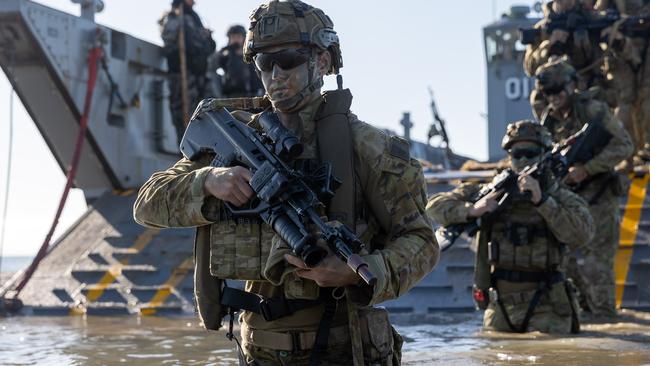
What it comes down to is the words they use and tone.
But in an election, it’s those two factors the electorate will use to judge which of the major parties are more likely to stand up to Beijing in the event its aggressive overtures turn more sinister and contrary to or infringing on Australia’s interest.
It’s a case of same same but different. The Coalition and Labor have similar foreign policies but when it comes to China, they speak a very different language.
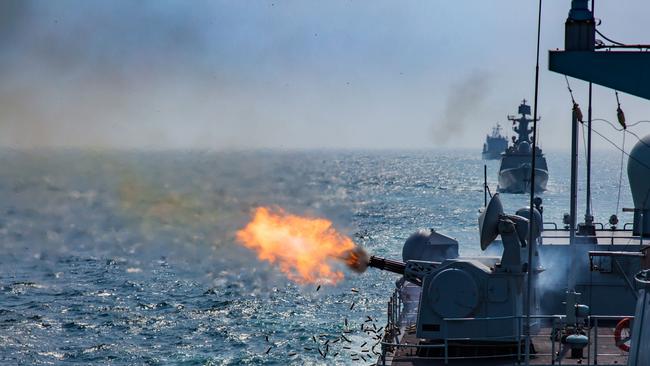
That is not to dismiss the depth of policy created by both the Coalition and Labor on the critical issue of national security but in this instance, it will literally be a war of words that will decide which party the voter will have more confidence in should the nation face potential conflict.
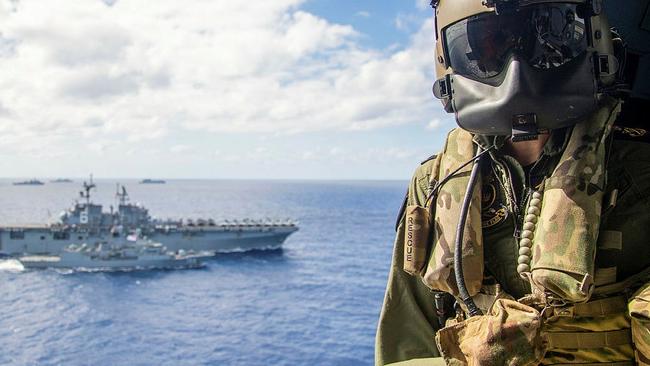
Prime Minister Scott Morrison certainly thought it was a war of words when, in an extraordinary exchange in parliament, he slurred Opposition deputy leader Richard Marles as a “Manchurian candidate”, in effect a politician being used as a puppet by an enemy power.
It was an attempt by Morrison to create an impression that Labor was soft on China as he cited an innocuous speech Marles had made in Beijing three years earlier around forging closer ties with China.
Morrison’s move backfired, with commentators branding it an unbecoming, desperate political stunt. ASIO spy chief Mike Burgess pointing out it was never helpful to weaponise national security and the prime minister retracted the insult.
So what is the difference?
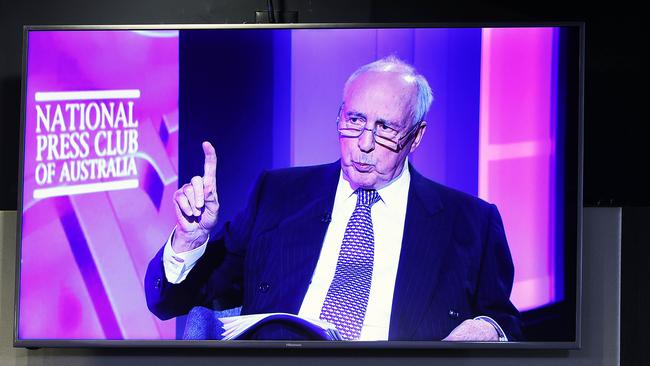
In tone, the Coalition has been on the front foot, initially in veiled diplomatic terms before outright naming China as being behind some of the nation’s most malicious cyberattacks, specifically on Australia’s critical infrastructure but also defence, its supply chains and utilities that keep the nation ticking.
The government has also been very forthright in outing China for attempts at foreign interference, blatant spying operations and also condemning Beijing for notable pushes into the Pacific with aid for impoverished nations.
Acts it has branded either debt trap diplomacy with huge repayments that cannot be repaid or quid pro quo deals with exchanges for unfettered access to military ports and bases.
Think Solomon Islands here.
Most recently the Coalition very publicly outed a Chinese spy ship off Australia’s coast.
These sorts of imposts would normally be confined to diplomatic cables or classified top secret memos.
The Coalition’s rhetoric has notably been led by Defence Minister Peter Dutton who has repeatedly warned about China’s regional aggression and unprecedented military build-up including the fact its warheads could reach every city including Hobart.
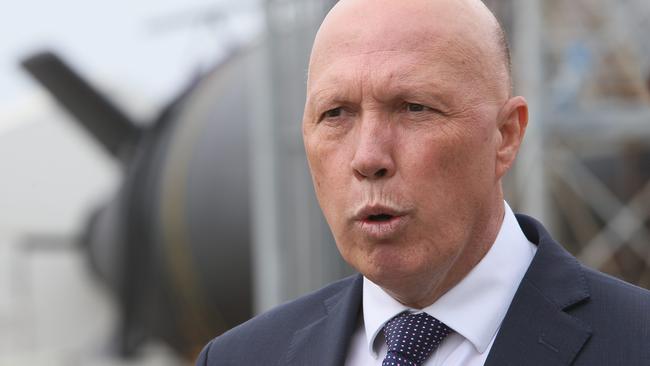
The Coalition has put its money where its mouth is, with the biggest defence upgrade in a generation pushing its commitment above the long-held threshold by successive governments of 2 per cent of GDP.
Russia’s invasion of Ukraine and warnings how such things could happen in Australia’s hemisphere have also been raised.
For its part, Labor has taken a softer approach in words, even if its policies match that of the Coalition.
It supported the AUKUS pact with the US and UK (albeit critical of the way it came about and diplomatic fallout from France) which includes an American military preposition in Australia, both permanent and temporary and nuclear submarines.
This is a departure from 2015 when it dropped references to the ANZUS Treaty as bedrock of regional stability.
Gone too over the past two years was recognition and praise for China’s power rise.
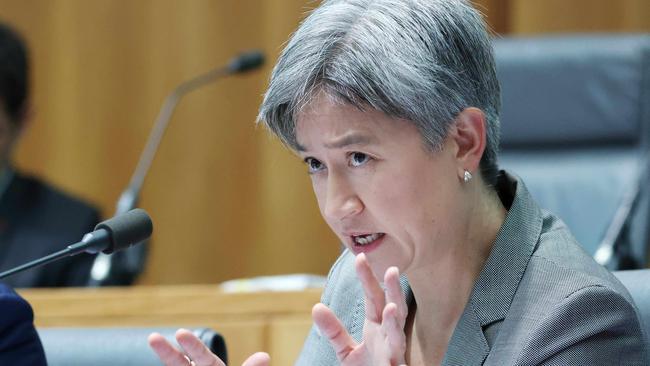
Labor’s foreign affairs spokeswoman and likely minister should they get power, Penny Wong, has noted the “more assertive China” and the regional reshaping.
But she has said Australia needed to flex soft power, less talk of guns and conflict and more of identity and diplomacy.
In a speech to the ANU late last year she did declare “military capability matters”, though adding “but we need more than that”.
“We need to deploy all aspects of state power – strategic, diplomatic, social, economic,” she said.
Albanese has said foreign policy thinking has had to change in the wake of China’s “changed posture” and it was right for Australia to call it out for bullying.
“China is the nation that’s changed in terms of their attitude towards Australian imports, for example, and Australian businesses are suffering,” he said, tying foreign policy directly to domestic fallout.
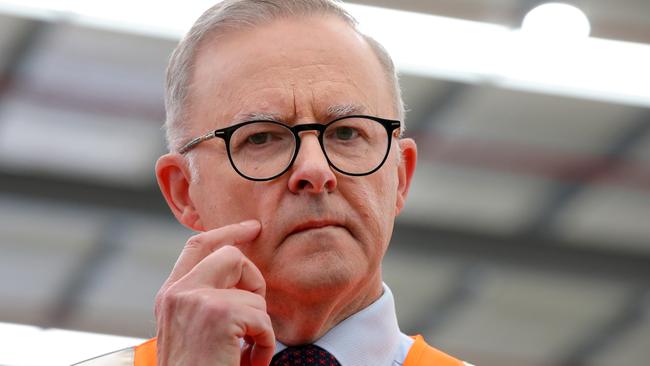
He more recently went further to counter claims Labor’s colour was China red, and post a confidential briefing from intelligence services, specifically publicly declaring “China is a threat to our security”.
But broadly his and his team’s strategy and language has been less chest beating – or beating of drums of war as Dutton’s former right hand man at Home Affairs Mike Pezzullo infamously stated – and more about how Australia needed to position itself to handle the inevitable China rise.
Labor has changed its foreign policy stance but in the face of evolving strategic challenges, it has had to.
There is ambiguity over the how the government, Labor or even the US for that matter would deal with a Beijing invasion of Taiwan.
All recognise the uncertainty of our times but while each talk words, their actions could be very different.
Originally published as Election 2022: Australia warned of China moving ships to Solomon Islands



